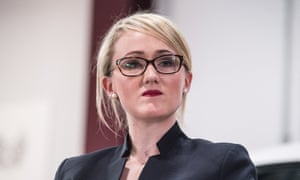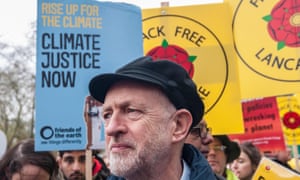By Paul Homewood
h/t Robin Guenier
It is truly frightening that this lot might actually get into power soon.
From the Guardian:
A future Labour government would oversee an economic revolution to tackle the climate crisis, using the full power of the state to decarbonise the economy and create hundreds of thousands of green jobs in struggling towns and cities.
Rebecca Long-Bailey, the shadow business secretary who is driving the party's climate agenda, said the UK's "entire society and entire economy" needed to be refocused to meet the looming challenge of ecological breakdown.
"It could not be made clearer to us and people are starting to realise how incredibly dangerous this situation is," said Long-Bailey, a close ally of the Labour leader Jeremy Corbyn and the shadow chancellor John McDonnell. "There is no option but to radically transform our economy."
But in an interview with the Guardian she said the crisis was also an opportunity to bring well-paid, highly skilled jobs and economic regeneration to some of the most marginalised communities in the country.
"We have to tackle climate change in a really radical way, the evidence is crystal clear," said Long-Bailey. "But this is also a wonderful opportunity to invest in those towns and cities that have felt neglected for a very long time … this has to be – and will be – a genuine transformation of the economy."
Labour's plan has echoes the Green New Deal being advocated by leftwing Democrats such as Alexandria Ocasio-Cortez and Bernie Sanders in the US.

And Long-Bailey said the experience of the French president Emmanuel Macron – who has faced widespread protests in part over new environmental taxes – showed that action on the environment must be part of a wider programme of social and economic regeneration.
"If you knocked on a door in Salford, where I am from, although most people care about climate change it is not going to be top of their list of priorities. Most people just want to know how their life is going to be improved.
"So it is important for us to position ourselves as a party that is going to tackle climate change but turn that into an economic opportunity for the vast areas of this country that have seen decades of underinvestment and provide jobs for the future and provide that revitalisation that communities want to see."
Corbyn put a radical green agenda at the forefront of his conference speech this year and a senior source in the leaders office said both he and McDonnell were "100% committed" to implementing the transformative agenda laid out by Long-Bailey as soon as Labour were in office.

The party's current target is to get 60% of the UK's energy from renewable sources by 2030 and to reduce greenhouse gas emissions to zero by the middle of the century.
But Long-Bailey said they needed to be "even more ambitious" and set targets for areas of the economy beyond energy, from heavy industries like iron, steel and chemicals to agriculture and land use.
"[Tackling climate breakdown] is one of the central pillars of our industrial strategy … it will take a huge amount of work and we know it is ambitious – but we also know it is not ambitious enough in light of what we heard from the IPCC report – so we know we have got to move very, very quickly on this."
Labour has brought together a team of experts including leading industry figures, engineers, scientists, consultants and academics, who will report back with a comprehensive plan in the new year, outlining what a sustainable energy mix would look like, how to achieve it – and what benefits in terms of jobs and investment it would bring.
Initial findings from the group suggest that to meet its current targets, Labour would by 2030 need to:
-
increase the UK's installed offshore wind capacity sevenfold
-
bring all 24m homes in the UK up to the highest efficiency standard
-
triple the UK's installed solar capacity
But Long-Bailey said this was just the start, with next year's report likely to add a raft of new radical policy proposals.
"They are working on a very detailed report at the moment about what our future energy mix needs to look like to hit these targets – we are talking about offshore and onshore wind and solar – but it is obviously going to go much further than that.
"This is about so much more than just the energy supply, it is about developing the supply chains and the manufacturing base so we can export our expertise around the world."

Long-Bailey, seen as a rising star in Jeremy Corbyn's Labour party, said the influx of new, often younger members, had energised the party's environmentalism and said it could no longer be viewed as "luxury item", to be dealt with as a separate policy issue.
Instead it was "now embedded into the DNA of every of every single department and every single economic decision we make".
"It can no longer be a message that if you want to help the climate it is enough to buy sustainable products or source your energy from renewable providers – we have gone beyond that.
"It is critical that our entire society and our entire economy is centred around this mission to tackle climate change … and the really exciting thing is if we do it right we can also improve the long-term prospects of people in this country."
Part of the challenge, Long-Bailey said, is to paint a picture of the positive future that is possible if society successfully meets the challenge of climate breakdown, as well as being honest about the potentially disastrous consequences of failure.
"When I was little I used to get this magazine called Quest," she said. "It had science and glimpses into what the future might be like and I used to get excited and think … "Wow, I could be a scientist or an explorer."
She said it was time to create that excitement and optimism about the future again.
"So in Salford we need to be telling people that by tackling climate change we can have a factory that is going to create wind turbines, is going to manufacture parts for offshore wind and show them that their child in the local school can become an engineer, that they will get proper pay and be in a job that is secure, well valued, with trade unions involved so they have that security and a collective voice," she said.
"Ultimately people need to know that their kids can have a really good, full and interesting life if we get this right."
https://www.theguardian.com/politics/2018/dec/24/labour-government-tackle-climate-change
It is hard to know where to start with such drivel.
Long-Bailey has no experience of expertise in energy, or for that matter industry in general. She studied politics and sociology at university, before training to be a solicitor.
The only reason she is Shadow Business Secretary is that she is a fervent acolyte of Jeremy Corbyn, for whom most serious Labour MPs refuse to work for.
The Labour manifesto at last year's election included the same promise, to ensure that 60% of the UK's energy would come from zero carbon sources by 2030. My analysis earlier in the year showed that this was pure fantasy. (See here.)
Moreover, the manifesto contained little in the way of concrete plans of how this could be achieved.
It is important to remember where we are starting from. (The table below is in Mtoe):
https://www.gov.uk/government/statistics/energy-trends-december-2018
Fossil fuels accounted for 80% of energy consumption last year. Of this, approximately 64% is for non-electricity use.
| Mtoe | Total | Electricity | Domestic | Transport | Others |
| Coal | 12 | 6 | 6 | ||
| Oil | 69 | 0 | 2 | 50 | 17 |
| Gas | 75 | 25 | 26 | 24 | |
| TOTAL | 156 | 31 | 28 | 50 | 47 |
Even if you could eliminate fossil fuels from electricity generation, which even the CCC admit is impossible by 2030, you would still need to make mammoth cuts in the other sectors. (The Guardian article mentions that "the party's current target is to get 60% of the UK's energy from renewable sources by 2030" I assume they actually mean "zero carbon", as the manifesto stated).
To hit the 60% zero carbon target would mean reducing fossil fuel consumption from 156 Mtoe to 62 Mtoe a year.
There is simply no way that natural gas for domestic heating could be replaced in such a short period. Nor is there any chance that EVs could make much of a dent by 2030, given the enormous infrastructural problems they pose. And if industrial users are compelled, one way or another, to abandon oil and gas, they will most likely shut down and transfer their operations abroad.
The three suggestions listed by the Guardian hardly inspire confidence:
1) Offshore wind poses several questions.
The first is the cost. It may be that the wind industry claims about falling costs are correct, but what if they are not? How much are labour prepared to pay out in subsidies to achieve their target.
There is then the problem of integrating such large amount of intermittent wind power. Even the Committee on Climate Change does not believe it is practical going beyond 25 GW of offshore capacity by 2030, an increase from the current capacity of 8 GW.
And even then the CCC say we would still need 97 TWh of generation from CCGT.
https://notalotofpeopleknowthat.wordpress.com/2018/02/20/labours-low-carbonpromise/
2) Home insulation will cost a lot of money. Where are the costings, and where will the money come from?
The Green Deal, which offered cheap loans for energy saving schemes at home, has been a total flop, as the numbers rarely stack up. The reality is that such schemes usually cost much more than they save.
3) Triple solar capacity.
This is the biggest joke of all.While solar power currently supplies around 3% of total generation, the figure drops to under 1% in winter months.
And what power is produced is so variable as to be virtually worthless to the grid.
https://www.solar.sheffield.ac.uk/pvlive/#
And, as with wind power, there is the little matter of cost. Since the ending of subsidies for new projects, new investment in solar has virtually dried up. In the last 12 months, solar capacity has increased by just 1.8%.
How much will Labour have to spend in subsidies to achieve its target of tripling capacity?
Apart from all of these technical issues. other, more fundamental questions need to be asked.
According to Long-Bailey, a future Labour government would oversee an economic revolution to tackle the climate crisis, using the full power of the state to decarbonise the economy and create hundreds of thousands of green jobs in struggling towns and cities.
But even if the UK stopped using fossil fuels completely, what effect would it have on climate, given that our emissions of CO2 only account for 1% of the world's?
The ides that government can create jobs, or that you can create them through subsidies, is economic illiteracy.
As for this economic revolution, heaven help us all. She goes on to say, "the UK's entire society and entire economy needed to be refocused to meet the looming challenge of ecological breakdown."
Forget about ecological breakdown. It is economic and social breakdown that we should fear if Labour get their way.
from Climate Change Skeptic Blogs via hj on Inoreader http://bit.ly/2ELiq3v






No comments:
Post a Comment